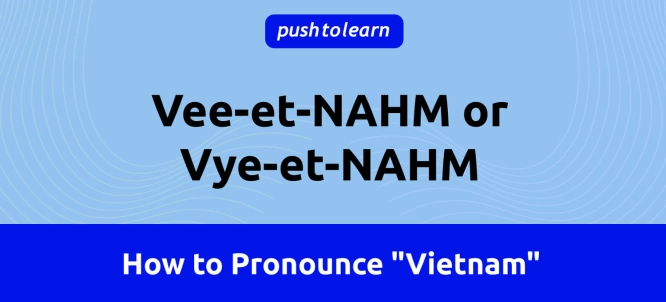by PushtoLearn
How to Pronounce "Vietnam" in English
Table of Contents
Pronunciation:
/ˌviːɛtˈnɑːm/ or /ˌvjɛtˈnɑːm/
Phonetic Breakdown:
"Viet": The first syllable is pronounced either like "vee-et" or "vye-et," depending on the accent.
/viː/ or /vjɛt/
"Nam": The second part is pronounced as "nahm," with a broad "a" sound, like in "car."
/nɑːm/
Stress:
The stress falls on the second syllable, "Nam", which is pronounced slightly longer and clearer than the first syllable.
Everyday Example:
You can practice saying it like this:
Vee-et-NAHM or Vye-et-NAHM
Both pronunciations are commonly used in English-speaking countries, with slight variations between American and British accents.
Historical Pronunciations and Their Origins
During the Vietnam War era in the 1960s and 1970s, American soldiers and media commonly pronounced "Vietnam" as /ˌviɛtˈnæm/, where the final syllable rhymes with "ham" or "slam." This pronunciation mirrors the tendency of English speakers at the time to anglicize foreign names, fitting them into familiar phonetic patterns.
An interesting parallel exists with the orthographic representation of the country's name. In war-era media and communications, "Viet Nam"—spelled as two words—was prevalent. This spacing aligns with the Vietnamese language, where "Việt Nam" consists of two words. The combined "Vietnam" became more standardized in later years, reflecting a shift towards a unified representation of the country's name in English.
Contemporary Pronunciation Trends
In recent decades, the pronunciation /ˌviɛtˈnɑːm/, with the final syllable sounding like "palm" or "calm," has gained prominence among English speakers, particularly in the United States. This shift aligns with a growing awareness and respect for native pronunciations of foreign names. The vowel /ɑː/ in the final syllable is closer to the Vietnamese pronunciation of "Nam," which is /naːm/ in the International Phonetic Alphabet (IPA).
The change also reflects broader linguistic trends in English, where there is a movement away from heavily anglicized pronunciations of foreign words towards ones that more closely resemble their native sounds. This phenomenon is not unique to "Vietnam" but is seen in other place names and loanwords, such as "Iraq" and "Iran," where pronunciations have shifted over time.

Linguistic Factors Influencing Pronunciation
Several linguistic factors contribute to the variation in pronouncing "Vietnam":
The Father-Bother Merger
Most American English dialects feature the father-bother merger, where the vowels in words like "father" (/ˈfɑːðər/) and "bother" (/ˈbɑːðər/) are pronounced the same. This merger influences how speakers perceive and produce the /ɑː/ sound, making it more common in words like "Vietnam."
Regional Accents and Dialects
Regional accents in the United States affect vowel pronunciation. For example, speakers from the Southern states may have different vowel qualities compared to those from the Midwest or Northeast. These regional variations can lead to differences in pronouncing the final syllable of "Vietnam."
Hyperforeignism and Hypercorrection
Hyperforeignism occurs when speakers over-apply foreign pronunciation rules to words, sometimes leading to pronunciations that are not accurate in either language. Conversely, hypercorrection involves altering pronunciation to avoid perceived mistakes, which can also result in non-standard pronunciations. These linguistic behaviors can influence how "Vietnam" is pronounced, especially among speakers aiming for a pronunciation they believe is more authentic.
The Influence of Vietnamese Dialects
Vietnamese itself has several dialects, and vowel pronunciation can vary between them. In the southern Vietnamese dialect, which many American soldiers would have been exposed to during the war, the vowel in "Nam" can sound closer to /æ/ (as in "cat"). This exposure might have influenced the soldiers' pronunciation, leading to the /ˌviɛtˈnæm/ variant.
However, the standard Vietnamese pronunciation is /viə̯t˧˨ʔ naːm˧/, where "Nam" has a long vowel /aː/. This closer approximation to /ɑː/ supports the shift in English towards pronouncing the final syllable as /nɑːm/.
Media and Cultural Impact
Media representations play a significant role in shaping pronunciation. Classic films like Full Metal Jacket showcase the /ˌviɛtˈnæm/ pronunciation, reflecting the common usage of the time. In contrast, contemporary media and news outlets are more likely to use the /ˌviɛtˈnɑːm/ pronunciation, aligning with current linguistic preferences.
Prominent figures and journalists also influence public pronunciation. For instance, during the Vietnam War era, news anchors with Mid-Atlantic accents, such as Walter Cronkite, would have used pronunciations that sounded more formal or "grandiose," potentially affecting how the public said "Vietnam."
Comparison with Other Loanwords
The pronunciation of "Vietnam" is part of a broader pattern in English where loanwords undergo shifts towards more native-like pronunciations. Words like "pasta" and "taco" have seen similar changes. In British English, "pasta" is often pronounced /ˈpæstə/, with a short vowel, whereas American English leans towards /ˈpɑːstə/, with a vowel closer to the Italian /a/.
These shifts highlight a growing tendency in English to respect the original pronunciations of loanwords, moving away from anglicized versions.
Conclusion
The pronunciation of "Vietnam" in English illustrates the dynamic nature of language and how it evolves with cultural, historical, and social influences. From the anglicized /ˌviɛtˈnæm/ of the mid-20th century to the more native-influenced /ˌviɛtˈnɑːm/ common today, these changes reflect broader trends in linguistic adaptation and globalization.

